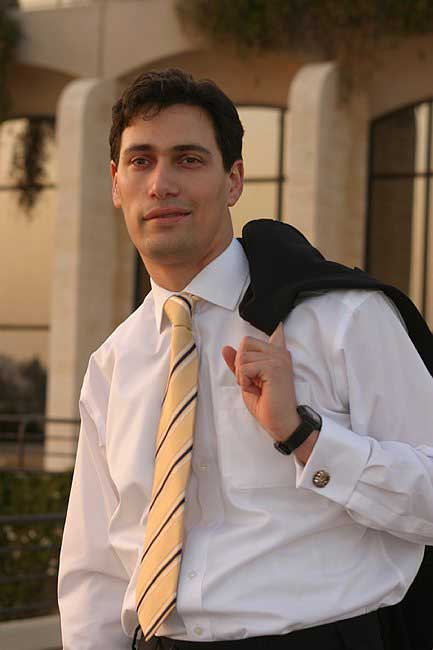My recent trip to Israel
I recently booked a trip to Israel a few days after the Foreign Office issued its warning against travelling to Iraq.
It’s assumed that anyone heading to Israel at present must be on a solidarity mission. If that were the case, my mission wouldn’t have benefited the tourism industry. As I have a brother, sister, grandmother, twenty-two cousins and numerous second and third cousins dotted around the country, accommodation has never been a problem for me.
Unlike tourists, appeals to visit or advice against doing so have little effect on the decisions to visit family there as often as possible. When my Grandfather passed away on 2nd February, nearly all my family were in Israel. All but three out of 28 grandchildren were abroad, two managed to make it for the Shloshim, and I wanted to be there for the stone setting which in Israel takes place at the end of the Shloshim. I could only come for six days, not much time when there are so many relatives to visit. Flying to Israel is always a culture shock, I hadn’t been there for a while and was curious to find out what the situation was really like. Numerous bombings had occurred since my last trip, including an attempted bombing of a restaurant that my brother and sister visited earlier in the year.
Upon arrival, one is struck by the fact that it’s pretty much business as usual. In fact, people I met in Israel had seen news footage of tanks at Heathrow airport and were frightened of coming to London. I recently went to hear David Horowitz, Editor of the Jerusalem Report. He illustrated how people are blinded by distance. “Everyone decides what level of risk they are prepared to take. People in Tel-Aviv are scared to visit Jerusalem (except for when it snows and then the roads are jammed with visitors), Jerusalemites are scared to visit the West Bank, those in the West Bank are scared to visit Hebron, and even those in Hebron are scared to visit Gaza”. There are also contradictions…such as Israelis deterred themselves from travelling on buses, yet respecting those who do. And there those who take buses everywhere, yet prefer their children to go by Taxi.
If I worried at all about safety, I was quickly reassured by the security that I saw everywhere. There seem to be guards outside almost every building. In fact, each time I was stopped and questioned, I felt a little more reassured. I sense a positive attitude amongst Israelis. It’s impossible to be positive and lead a normal life whilst continually looking over ones shoulder. Amongst those I met, the main topic of conversation was not security but the London Eruv which was covered extensively in the national newspapers.
Apart from the security situation, I was also interested to see how Israel was being affected by its worst recession in 50 years. On the face of it, one wouldn’t even know there was a recession. Whilst travelling from Haifa to Jerusalem, I drove through Tel–Aviv via the Ayalon Freeway, and as I passed through, I saw brand new trains that would make British commuters envious, taking travellers at high speed to Petach Tikva, Ashdod and even Beer Sheva. And on my left and right, I saw gleaming skyscrapers that would dwarf the city of London’s skyline. No sooner did I leave Tel-Aviv, I passed the brand new Ben Gurion Airport that is nearing completion. Thirty minutes minutes down the road, I arrived in Jerusalem to see billboards advertising the new light railway. I am concerned that there is so much building going on, I worry about whether there will be any countryside left. Israelis don’t want Palestinians taking their land, yet don’t seem at all worried about the planners. There appears to be a shopping mall in every suburb. If the English are a nation of shopkeepers, Israelis are a nation of shoppers. It’s as if Israelis are literally trying to build and shop their way out of recession.
The purpose of my trip, was my Grandfather’s stone setting which took place the day before I returned to England. He was buried on Har Hamenuchot which is on the outskirts of a Jerusalem. It’s more of a Necropolis than a cemetery, and trying to find the right burial plot is like trying to negotiate a maze. Nothing makes one more aware of Israel’s permanence than its cemeteries, and nothing else makes one more aware of its high population density. Large cities in Europe have found partial solutions to their burial problems by leasing graves for fixed periods and then reusing them if the lease is not renewed. In Judaism that isn’t possible, a grave is 'forever,' that is, until the coming of the messiah, and as a result, they have now had to build multi storey cemeteries, and there are even plots in the walls.
In Israel, those who have died have a stronger presence than those are living. As a people, we have wandered from place to place, but those who have died have stayed put. One only has to witness the emotions aroused by Jews and Muslims around the cave of Machpelah to see this.
It is perhaps the cemeteries more than any other place that bring home the full horror of the second Intifada. As you pass row after row of graves, mourners will point out the plot of this or that family who died in a bus bombing, and they can even remember the route number. After the Sbarro restaurant was bombed, the venue was quickly rebuilt, business returned to normal and one wouldn’t even know it had happened. At the Har Hamenuchot cemetery, one cannot so easily forget.

